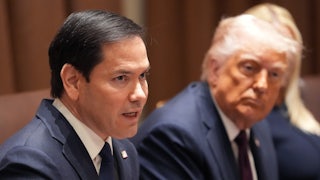Over the next few months, editors at The New Republic are choosing their favorite episodes of The Politics of Everything.

Summer Pick #1
Episode 24: “The Case of the Sick Spies”
In late 2016, staff at the American Embassy in Havana began hearing strange noises and experiencing odd symptoms: headaches, nausea, dizziness. Had they been targeted by a secret weapon, perhaps deployed by Russia? Hosts Laura Marsh and Alex Pareene talk to four people who have closely followed Havana syndrome, as the collection of ailments came to be known: Jack Hitt, who covered the story for Vanity Fair in 2019; Tim Weiner, author of The Folly and the Glory: America, Russia, and Political Warfare 1945–2020; Adam Gaffney, a physician; and Natalie Shure, a columnist for TNR who covers health policy. What was the diplomatic context in which Havana syndrome appeared? Why is the secret weapon theory so attractive? And is there a likelier explanation for the mysterious illness? The show, which originally aired in February 2021, has been updated to account for more recent developments.

Summer Pick #2
Episode 23: Against Remote Work
As its boosters have long argued, remote work offers a slew of obvious benefits. Companies save money on rent; employees don’t have to commute; and everyone, without the distractions of the office, can be more efficient. But for decades, telecommuting simply failed to take hold. Hosts Laura Marsh and Alex Pareene talk with the writer Richard Cooke about why that is. And now that the pandemic has changed our habits so drastically, what does our historical reluctance to work from home augur for the post-pandemic future? Later in the show, Katie McDonough, a deputy editor at The New Republic, investigates the fantasy of escaping from work altogether, with a look at the politics of early-retirement advice.

Summer Pick #3
Episode 26: The Unnatural Endurance of Bipartisanship
Joe Biden ran for president promising to revive the spirit of bipartisanship and bring Americans together after an era of painful division. But when facing an intransigent, extremist Republican Party that has little to gain from compromise, such a vision of politics can seem quaint at best. Hosts Laura Marsh and Alex Pareene examine the history of bipartisanship as an ideal. The show features Paul Blest, a co-founder of Discourse Blog; Ed Burmila, the author of a forthcoming book on the mistakes of the Democratic Party; Osita Nwanevu, a TNR contributing editor; and Julian Zelizer, a professor of history at Princeton University. Does bipartisanship have a future in American politics? And, more to the point, should it?

Summer Pick #4
Episode 12: Monopoly Is Tyranny
The economy as we know it is populated by gigantic corporations, behemoths that have bought up not only their competition but also the businesses supplying or otherwise supporting them. Such monopolies act as a “rival form of government,” explains Zephyr Teachout, the author of Break ’Em Up: Recovering Our Freedom From Big Ag, Big Tech, and Big Money. Hosts Laura Marsh and Alex Pareene talk with Teachout about the dangers of allowing these outsize companies to grow unchecked, and what should be done about them.

Summer Pick #5
Episode 19: Libertarian vs. Bear
In the early 2000s, a group of libertarians moved to a small town in New Hampshire, where they set about slashing the municipal budget. The newcomers wanted to be free from taxes and government regulation, and they envisioned an experiment that would show the world the virtues of their political philosophy while allowing them to live as they liked. But before long, they found themselves fighting off packs of black bears. Hosts Laura Marsh and Alex Pareene talk to Matthew Hongoltz-Hetling, the author of A Libertarian Walks Into a Bear: The Utopian Plot to Liberate an American Town (and Some Bears), about the ensuing chaos, and the political lessons to be drawn from it.




